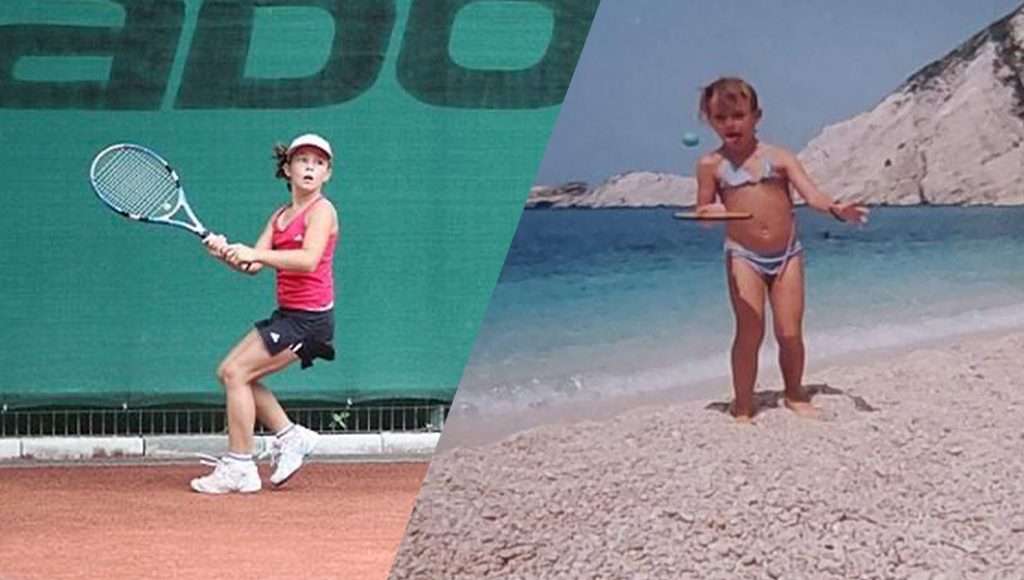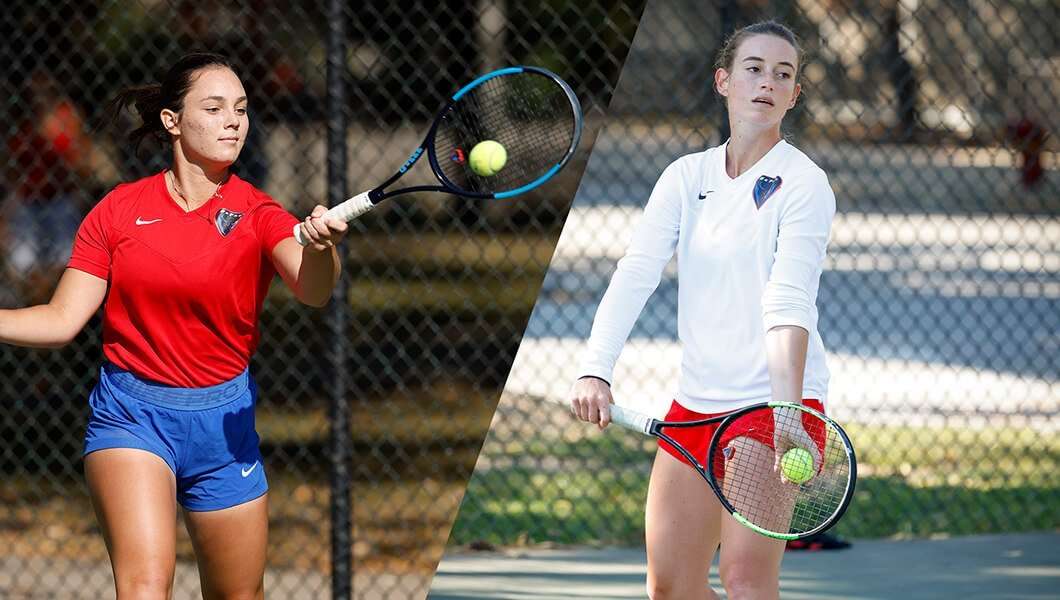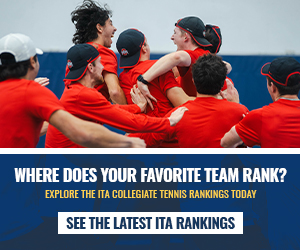Courtesy of DePaul University
Commemorating the 50th anniversary of Title IX, DePaul Athletics is highlighting the impact this historic, landmark federal legislation had on female students including Blue Demon student-athletes.
The groundbreaking gender equity law has impacted millions of girls and women both in athletics and in the classroom.
At the time the law was passed in 1972, there were little more than 300,000 girls and women competing in high school and college sports nationwide. When Title IX turned 40 years old in 2012, that number had grown to more than three million.
The ramifications on females in this country have been well-documented. But what about the Blue Demons from other countries who compete on DePaul women’s teams? They can provide a unique perspective of gender equity overseas and their reactions to Title IX.
In their own words, No. 1 singles standout Yuliya Kizelbasheva and graduate assistant coach Aspasia Avgeri share their experiences and feelings.

My Journey From Russia to the USA
By Yuliya Kizelbasheva
Hey, I’m Yuliya, a third-year student playing tennis for DePaul. I have been playing tennis since I was four years old.
It was not a plan for me to become a tennis player. I got there by chance because my friend started taking tennis lessons and I would always join him everywhere since our moms are best friends.
I did not take tennis seriously when I was that small and went to a lot of kids’ camps at the same time—swimming, gymnastics, figure skating, art classes, and tennis. Going into first grade, my parents made me choose one sport that I would focus on and I chose tennis.
This decision has changed my life. I was born and raised in Russia and participated in Russian junior tennis tournaments. Throughout my whole tennis career in Russia, I would say that everyone would be treated in a fair way, no matter if you are a boy or a girl.
Based on their success, tennis players would receive different awards, sponsorships, and other benefits. To be physically stronger on the court, I was looking for opportunities to get better every day.
Something that significantly improved my performance was kickboxing. In my country, all martial arts are considered to be for boys only. I could see this tendency during kickboxing practices. I was in a group with 20 boys and only four girls.
I was fortunate to have an amazing coach who understood that I was attending kickboxing practices to be better in tennis, and he did his best to help me succeed.
Just as in tennis, I was treated the same as those 20 boys. We would do the same exercises, and I would spar against both boys and girls. During practices, I was always treated in a respectful way.
But outside of the gym, people would give me a completely different attitude. Since I was doing such a physical sport, most people would be surprised I decided to do martial arts.
If you are a boy in my country, you are supposed to play soccer, hockey, and martial arts. If you are a girl, they expect you to do gymnastics or figure skating. Breaking the stereotypes is something girls in martial arts have to endure.
I never planned to study in the United States until one of my older friends got a full tennis scholarship to an American university. After seeing some other tennis players getting into U.S. colleges, I decided to consider this option as well.
Moving to the U.S. and becoming a student-athlete at DePaul has completely changed my life. I was considering DePaul as my top priority right after the first talk with the ex-coach.
I decided to come here. When the phone call informing the coach of my decision ended at 1 a.m., I remember waking up my parents because I could not keep the news until the next morning.
It was a challenging first several months being so far away from my family. Because English is not my native language, it was difficult at times to express myself.
But everyone around me was exceptionally supportive, and I have never felt disrespected. Joining the DePaul women’s tennis team including coaches Marisa Arce, Cassidy Spearman, and Aspasia Avgeri is the best thing that happened to me in the U.S.
Being on a team with strong women inspires me to take on new challenges and get better every day. I have never heard of anything like Title IX back home. I think it is a great law that helps make sure everyone is treated equally and has the same benefits.
I feel this law has to be duplicated on an international level since women’s rights in a lot of countries are infringed upon and there is no support or opportunities for thousands of talented women to achieve their goals.
My Journey from Athens to Chicago
By Aspasia Avgeri
Hi! My name is Aspa and here is my story.
I grew up in a suburb of Athens in Greece called Ilioupoli. I was raised in a family of six that did nothing else but support me through everything. I’m the youngest child of four which is the reason I’m so competitive and driven at everything I do.
Since I was a child, the only thing I wanted to do was to follow my sisters around and pretty much do whatever they were doing. For example, my sisters started doing English tutoring sessions after my mother arranged for an English teacher to come to the house once a week. At that point I was only four and wasn’t allowed to be in the room with them which was really upsetting.
When the teacher first came in the house, she went straight to the living room to start the tutoring session. My mother closed all the doors around the living room so they could have some privacy.
I wasn’t allowed in the room and was so upset that I stayed outside the door throughout the whole session, eavesdropping and learning as much as I could so the next time the teacher came, I could tell her something in English. I was hoping she could convince my mother to let me be part of the session. And that’s exactly what happened!
For me, tennis started in a similar way. During the summers, my family and I would go to my grandparents’ house, which is close to a really nice beach with a great beach bar. Everyone at the beach would play “beach tennis with a wooden racket hitting the ball back and forth with no bounce.
All my siblings had a racket except me because I was only five years old and they didn’t think I could play. I made sure I complain to my mother about it. She went to the store and got me a plastic racket because it was lighter and easier to lift.
As soon as I grabbed that racket, I asked my father to play with me. I was playing so good that random people would stop and ask me to play with them. Of course, I was up for the challenge. So, I would play with them—and the minute we were done, they would head to the beach bar and buy me ice cream.
I told my mother that we needed to come here every day at the same time so I could play with the same people and they would buy me different treats such as ice cream, crepes, club sandwiches, etc.
A couple days later, a new guy came to the beach and he also wanted to play with me. After we exchanged some shots, he told me that he is a tennis coach and I should really start playing tennis because it looks like I could be good at it.
After he said that, I just grabbed him by the arm and made him repeat it in front of my mother so she could sign me up for classes once we got back to Athens. My parents were speechless but they agreed to do it and said it would be my birthday present for turning six in July. The minute we got back to Athens, they signed me and my siblings up for tennis classes.
I fell in love with the sport right away. At the same time, I was also doing basketball, soccer, and swimming but nothing made me more excited than playing tennis. Tennis has been part of my life since the age of six and it has been an amazing journey.
The unique thing about tennis in Greece is that it welcomes and treats both girls and boys equally which is not the case with some other sports such as basketball or soccer. My generation had some exceptional tennis athletes both females and males, and the top eight of each category were eligible for sponsorships from sporting goods companies Wilson, Head, and Babolat, which reinforced our passion to keep competing and travel everywhere for tournaments.
I got the opportunity to play in tournaments and represent my country in places such as Austria, Switzerland, Germany, Italy, Slovenia, Czech Republic, Serbia, France, Russia, Turkey, and Netherlands.
Girls and boys were treated the same in all these tournaments. I competed in all these countries and never felt that I did not belong or that I was any less fortunate than the other athletes.
When I was 14, I was a ranked European player, and it was one of the most successful years I’ve had in tennis. I won a couple European tournaments and was ranked No. 1 in Greece.
I knew that I only had a couple more years to play tennis because as soon as I turn 17, I would need to give up tennis and devote my time to academics. When you reach the age of 17, all the athletes in Greece are forced to make a decision.
You either start studying to pass the national exams and enroll in a university or you pursue the career of a professional athlete. We don’t have college sports in Greece. Athletes are forced to choose between the sport that they love and education.
I was fortunate enough to find a solution that combined both by coming to the U.S. When I was 16, there was only have one year left of competing before giving up the sport I love so much.
While I was playing in a tournament in my hometown, I heard that a tennis coach from a school in the U.S was at the tournament to watch a Greek player that was a year older than me. I was playing a match against a really good player that had a WTA (Women’s Tennis Association) ranking and the coach was outside my court the whole time.
I remember being so confused as to why the coach is here until I got to talk to him and learn about college athletics. The coach told me about the exciting opportunity of pursuing a degree in the U.S. and continuing to play tennis at a high level.
After chatting with him, who I soon learned was from DePaul, I was intrigued by the idea and started doing my research the minute I got back home.
I couldn’t believe that this is a real thing. But for sure it was!
Time passed and I found myself with the dilemma of staying home and saying goodbye to tennis or moving to the U.S. that would allow me to combine both my love for education and tennis. I thought about it a lot. Going to the U.S would mean I had to leave my family. But in the end, I decided to come, and specifically to DePaul.
At that point, I was one of the few people in Greece that knew about this opportunity, and I made sure that younger athletes are aware of this option. After my freshman year at DePaul, I went back to Greece for the summer and visited my tennis club.
I talked to so many young female athletes about how things are, how my schedule included so many tournaments and how housing, tuition, and health insurance are all covered by our scholarship. Soon enough, junior athletes were now practicing and competing with the dream of playing tennis for an American university.
My tennis career at DePaul has been a journey filled with ups and downs along with some of the best people which I have the honor to call family. My teammates and the coaches, Marisa Arce and Cassidy Spearman, were my motivation to give my absolute everything on and off the court—which is the reason I was able to finish my college tennis career on such a great note.
They were the people I was fighting for, and they are the ones that pushed me to become a better version of myself on and off the court. When I received these great awards, I was so happy because that was proof of what a great team we are and how we can achieve anything if we just want it enough.
I remember my parents calling me about the awards and they were so confused. They didn’t really know what these awards meant so I spent a good amount of time explaining.
Once they understood, they were really proud of me and the team and they told me that we should celebrate it when I got back home, which we did with a lot of delicious Greek food.
(Following her final season, Avgeri won: BIG EAST Player of the Year, All-BIG EAST First Team, BIG EAST Overall Female Scholar-Athlete of the Year, BIG EAST Sport Excellence Award, BIG EAST Female Institutional Scholar-Athlete Award, BIG EAST Team Academic Excellence Award, Intercollegiate Tennis Assn. Scholar-Athlete Award, ITA Team Academic Award, CoSIDA Academic All-District First Team, CoSIDA Academic All-America First Team, DePaul Female Athlete of the Year)
After I was done with my college career, coach Marisa Arce offered me the GA assistant coach position which meant I had the opportunity to spend one more year alongside these great people. I was so happy, and it took me approximately 0.01 seconds to accept it.
Being an assistant coach is different than being a student-athlete, but at the end of the day, we still have the same goal. Everyone is doing their part and we all work together to win the BIG EAST Championship and advance to the NCAA tournament. My role is now different, but I’m giving absolutely everything I have to be the best I can be and contribute to the team in any way possible.
Marisa has been a phenomenal leader and mentor to me, and it’s an honor to learn from her in order to improve and perform my best.
Tennis is the reason that I’m here, and I will always be grateful for everything it has given me. Because of tennis, I have visited so many countries, talked to people from all around the world, and learned so much about their culture and their heritage.
I learned how to be independent, and it made me believe that hard work always pays off. It has taught me not only how to handle pressure, but also how to use the pressure to grow as an athlete and as an individual. It taught me that I can rely on myself and made me a stronger person both mentally and physically.
Tennis is what brought me to the U.S. and allowed me to pursue a finance degree which wouldn’t even be possible without Title IX. Because of this federal law, so many aspiring young female athletes were given the opportunity to participate in college athletics and receive the same benefits as male athletes.
And for that, I will always be so grateful.












